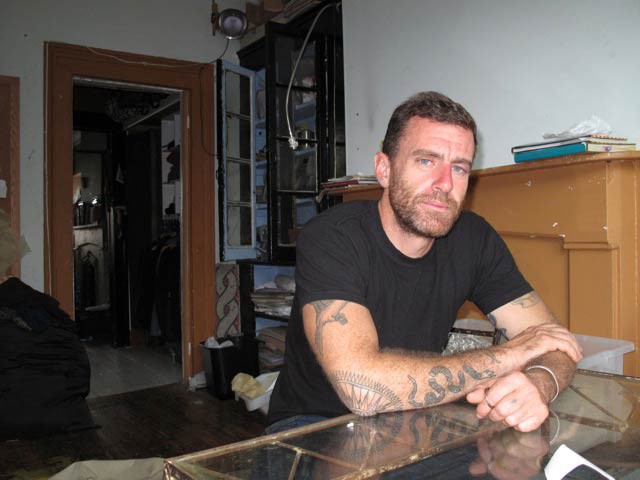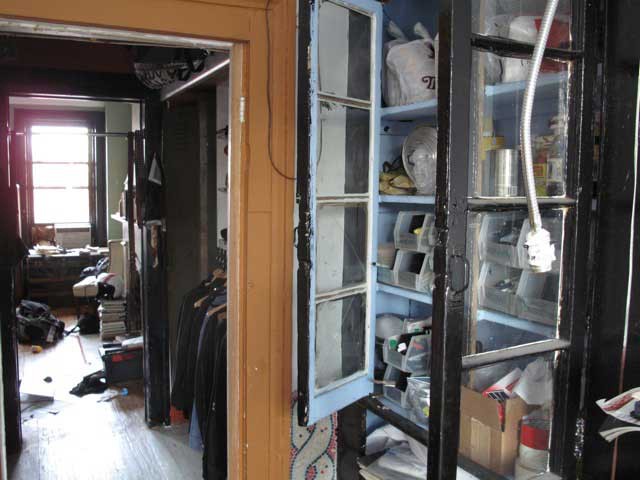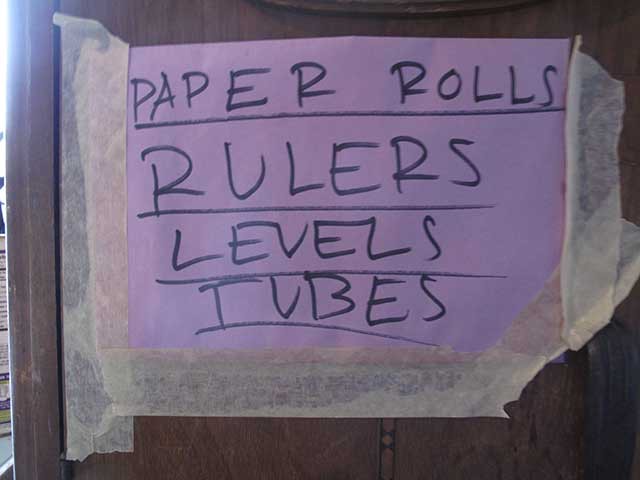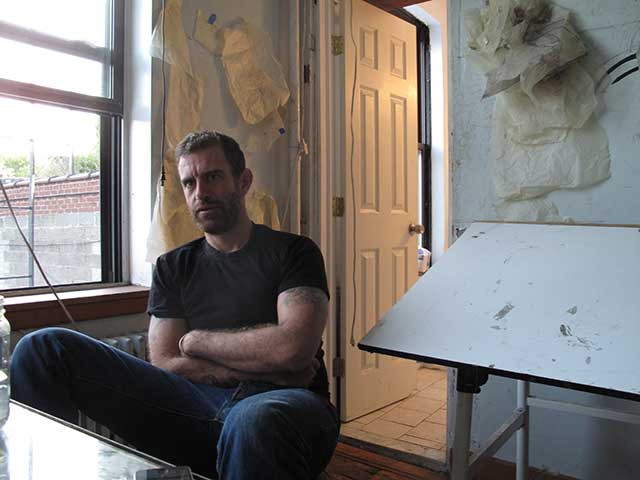How They Got There: A Conversation With Artist Duke Riley
How They Got There: A Conversation With Artist Duke Riley
by Noah Davis

Duke Riley postponed our first interview because he was freight-train hopping across the country. The Rhode Island School of Design- and Pratt-trained artist needed to be in San Francisco for meetings so he and a friend worked their way west. They made it, eventually.
Jumping on trains is usual behavior for someone who lives a highly unusual life. Riley moved to Brooklyn in 1997 and meandered his way into the city’s art world by doing his own thing. He threw parties in abandoned buildings on the Brooklyn waterfront, made art, and ended up owning a tattoo parlor, essentially by accident. Jerry Saltz credited the 38-year-old as one of the people “righting the ship that is the New York art world.” Riley continues to tattoo, although not as much as he’d like due to his growing commitments in the more traditional art world. There’s never enough time to create.
Half-finished drawings done on curling parchment paper cover the walls of the paint-splattered living room in the Red Hook apartment where he’s lived for 14 years. Riley — arms lined with tattoos and eyes lined from a lack of sleep — reclined on one of the room’s two mismatched heavy metal chairs and chatted about his freeform life.
When you were a student at RISD and you were looking down the career path is this a place you thought you would end up?
I studied painting, so ultimately I wanted to be an artist. I worked as a tattoo artist, and it was something that I had always had an interest in. It was something I enjoyed, even when I was younger, as was painting and art. Whether or not I thought it was something I thought I was actually going to stick with, I’m not really sure. As much as making art was something that I always thought I was going to do, I don’t really think I believed it was possible.
In a financial sense?
Yeah. Or maybe it was self-confidence, too. I felt like there were plenty of people who I was studying with who seemed extremely confident that they were going to move to New York and start having a career as an artist. I never even thought that was possible.
Tattooing, while certainly artistic, is more financially viable than “I’m going to move to New York and be an artist.” Did that play into your thinking?
Definitely. When I got out of school I didn’t fully grasp how you sold art and made a living. I was thinking that tattooing and various other illegal enterprises I was involved in at the time were probably more realistic.
It’s funny that the illegal enterprises were the stuff you thought you could get paid for. How did that change? Was there a moment where you thought you could make it as an “artist”? Or was it more of a gradual progression?
After I got out of school, there was a point in time where I stopped tattooing. When I moved to New York, I was trying out various different occupations that might be slightly art-related just to be involved in making stuff. I was very intimidated by the whole art world. I didn’t even like to go into galleries because I felt like I didn’t belong. It was a slow transition.
You’re a bit of an art outsider. Is there a feeling that you were doing what you wanted to do and then people found you?
I think honestly, the easiest thing to say would be that I fell accidentally back into tattooing. All of a sudden, I was making pretty decent money doing that. I could support myself. I don’t really own anything. I don’t particularly think that’s noble. It’s more of a personal flaw. When I have free time, the idea of going to a store to buy basic shit and stand in line on a weekend, I really can’t be bothered. So when I wasn’t tattooing, I was putting money towards these different art projects I was obsessing about. I wasn’t thinking about doing them as a way to make money, or even that making money with them was possible. It was just something that I felt like I had to do. When I think about the different stuff that I do, a lot of it is some kind of anger management. I have a theory behind the work — the concepts and what it stands for — but there’s some sort of internal thing that drives me to do stuff.


Tell me a little about how you got back into tattooing.
When I moved to New York, I decided I was going to stop tattooing. I moved down here [to Red Hook] and I had a bunch of various jobs. I wanted to be one of those guys who paints the murals on the side of Houston Street. I worked a lot of crappy jobs for a long time. It was around the period when all the Internet stuff was taking off. It seemed like a lot of these people I had gone to school with were getting these crazy jobs where they were making tons of money to do nothing. I was working these bullshit jobs for like $6 an hour and working with really hazardous chemicals.
I was doing some woodworking stuff with a guy, and he had a space rented in Greenpoint. We worked out a deal with the landlord where we were going to take the empty building, renovate it and make this affordable space for artists. It was an idealist plan that didn’t really work out. We had aspirations to form this guild where people could get health insurance and eventually buy their space. It had all kinds of problems. I had a problem with one of the tenants who was renting space. I got attacked by this guy in the building, and in the process of defending myself, the guy lost an ear. I ended up getting arrested and thrown in jail. I had to get bail money. What I didn’t realize was that when you remove a body part in New York, it’s an attempted murder charge. Suddenly, I was facing these huge charges for this thing that I had done. There were witnesses that saw it was self-defense, that this guy had just gone apeshit or whatever, but all of a sudden I was in this situation where I was in deep shit and really needed money bad.
I hadn’t tattooed in years at that point. My friend T-bone was in a band with this other guy, Mad Dog. [Laughs, very genuinely] He was working at this tattoo shop with these Korean gangster guys. Mad Dog wanted to help me out, so he invited me to start tattooing there. I didn’t even realize tattooing was legal in New York, but it had just become so. I was working anywhere from 12 to 16 hours a day, tattooing nonstop, six or seven days a week. It was pretty insane. I worked there for a while, and I made enough money to pay off my lawyer and that thing eventually resolved itself.
How did you end up owning a tattoo shop?
I started working at another place, and the guy who owned it got really sick. He had to leave to deal with his health issue. He walked out the door one day and never came back. The landlord came around and was looking for the rent, so I just started paying the rent on this business that nobody seemed to know who owned. Eventually, I ended up owning a tattoo shop, which really wasn’t something I intended to do either.
I moved the shop back out to Brooklyn, and it’s in the same building where I originally was doing the failed collective thing. I guess the restraining orders were over. [Laughs, again genuinely] I still had access to the space. I continued tattooing. I was also teaching a little bit in domestic-violence shelters.
Was that Oyster Arts [a program that organized arts education in domestic-violence shelters]?
Yeah. I was mainly doing a lot of drawing and mosaics. At that point in time there was a lot of abandoned space along the Brooklyn waterfront. I spent a lot of time down there fishing and doing whatever else. I’ve always been drawn to those areas. I was having parties and throwing clambakes down in the abandoned buildings on the waterfront.
When was that?
The late ’90s and the early 2000s. It’s not that I didn’t think about them as art. It’s more that I didn’t think about them as art that other people in the art world cared about. I wasn’t about to go to a gallery and be like, “Hey, guess what? I had a big crazy party in an abandoned building. We cooked fish and this and that and the other thing.” I felt a strong drive to keep making these things happened, but I didn’t think it would be anything that anyone else would be particularly interested in.
Around that same time, I was venturing out into the river and documenting different things with a video camera. I didn’t know exactly what I was doing with that either; I just knew I had a strong compulsion to do it. I kept dumping money into these weird things.
Eventually, I felt like there were people around me who were taking credit for things that I had done. I started to recognize the value of what I was doing. There were other people who were trying to cash in on it. That, not the financial reason, was a motivating force to push myself forward. If I feel like somebody is trying to take advantage of me or if I witness something else or some wrong doing, it stimulates me and creates a motivating force to correct it.
Did you get involved in the politics of the art world?
I don’t really know anything about that stuff at all. To be honest, I’ve always had a lot of frustration, anger and confusion about it. I don’t have anything to complain about now, but that was not something I was any good at. My frustration with that stuff drove me to go back to graduate school. I really didn’t know how to go about networking in the art world. And I still don’t. I’m not good at it and I don’t really have a desire to. I have a lot of friends who are artists, but I wouldn’t say they make up the majority of the people I socialize with. I never know what’s going on. I don’t know how people have the time to do all that stuff — to go to openings and network — and still make anything. I feel like I’m pretty busy with the making part.
How much time to you spend making art every week?
It depends. I don’t really feel like I’m ever not working, but a lot of the stuff that I do when I am working is pretty fun. I can’t really complain. It really varies, but I’m pretty much always working on something.
Do you set quotas for yourself or does it just happen when it happens?
There are certain time schedules. You have to meet deadlines that you set for yourself.
If you could tell your 20-year-old self something, what would you tell him?
I don’t know. I would definitely say that when you’re in high school, people always say you thought you knew everything, and then you grow up. I look back and think, “Maybe I did actually know everything.” I feel like my outlook on the world when I was a teenager, a lot of those things have come true.

Is there a place where you would like to get to in your career?
As far as what would satisfy me? [Long pause] I don’t know. I don’t really know that I have that much of a plan. I don’t have a clear career plan that I would say, “I’m trying to get a show at this place.” I constantly look at my life, think about how much time I have left, and try to figure out how I want to spend it. I deal with things that happen immediately in the future and then the thing that will happen way off in the distance. You look at how you’re going to grow and develop into doing something that will hopefully have some meaning or impact.
I don’t ever see myself stopping making art. It’s not really something that you retire from, but that doesn’t mean that I would limit myself from evolving into something entirely different if that was the course it took me in. It could potentially just change completely. Since I don’t have a stopping and starting point between working and not working, I’m just living my life.
Do you even consider yourself an artist in the sense that “this is my job”? It kind of sounds like it’s more that this is your life and you happen to make art as a big part of it.
I think that life is mainly about survival. [Laughs] That’s a pretty obvious thing to say, but that’s how I approach things. As you get older, things get a little bit easier in certain ways. You face different struggles. What it means to survive changes in terms of what you’re struggling against. Some challenges rise up and other ones go away. The direction of your life can shift and that ultimately can shift what you’re doing as an artist.
You seem to have a nice combination of thoughtfulness and spontaneity in your life and your art. It’s almost like nothing you do is planned but everything is considered. Fair?
I don’t know. I feel like I try to plan, but you can only plan so much. There’s always risk in anything you do.
Sure, but I think the freight train is a good example. That’s a planned thing, but it’s also not. It’s not like you bought a plane ticket to the West Coast.
Oh, absolutely. Riding a freight train is a lot more like sailing a boat. You try to prepare yourself as best you can, but you never really know exactly what is going to happen between point A and point B. Or whether you’re even going to make it to point B.
Do you like that feeling of prepared but not planned?
In that instance, there’s something that is very liberating about it, sure. It’s a lot less stagnant. A lot of people need comfort and security to function at their most productive and capable. That’s when I feel like I’m the least productive and functioning. I tend to shut down in those situations.
Are you still tattooing?
I still tattoo a little bit. It’s not something I see myself ever stopping doing either. I like communicating with different people. I like the social aspect of it.
It seems like a badge of honor to have one of your tattoos. I was looking at pictures of an opening at a gallery for some of your work and there were a bunch of images of the people there proudly pulling up their shirts or whatever and displaying the tattoos you did.
Yeah, that’s kind of cool. I don’t have as much time to do it as I want to, and it gets hard because there is a lot of stuff I want to do that I can’t. I like the immediacy of tattooing as well. Even in a monetary sense. I prefer to do things in cash. It’s just a real simple transaction. You tattoo someone, and they hand you money. There are no meetings with people and galleries and museums and contracts and that kind of shit.
Who should I talk to next?
Noah Davis is frequently lost.
